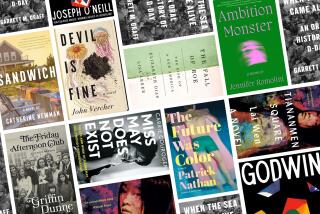Book Review : Friends From an Idyllic Youth Enduring the ‘60s
Painting on Glass by Jessica Auerbach (W. W. Norton: 284 pages, $16.95)
As late as Page 97 in this 284-page book, the reader is left wondering: How can this be a book about the ‘60s? “Painting on Glass” is supposedly set in the years before and after the 1968 conventions and election. Its hero, Jacob Marsh, has chosen to avoid the draft and the war in Vietnam by going to live in Canada; its heroine, Rachel Rothstein, has married a bozo named Ben who everyone except Rachel knows is the wrong man for her. So, the author says this book is in the ‘60s, but it seems, for the first third of the novel, to be another story altogether.
No real reference here to the politics, the music, the drugs, the demonstrations (either love-ins, or race riots, or teach-ins, or peace marches), but be patient! The author has something else in mind. This is a novel about values, about what is “new” and what is “old”; about what was best about the ‘60s and what was worst.
Rachel Rothstein has been well brought up, and in a rural setting. Her parents have always lived by a lake, as did their neighbors, Mr. and Mrs. Marsh, parents of Jacob. Rachel and Jacob have been best friends forever, living out an idyllic childhood and adolescence. Jacob will be a fine artist when he grows up, and Rachel an art historian; they trade school talk, fix each other up with dates, etc.
Rude Shove by History
Then history gives them both a rude shove. When Jacob graduates from Yale, it seems that no job will give him quite the right deferment; he’s not a Quaker, there seems no way out of the draft. He goes through his physical, announces that he refuses to be inducted, then leaves and immediately crosses the border into Canada. Goodby, Jacob. Rachel, with the same sort of absent-mindedness that characterizes her old friend’s actions, falls in bed with, then gets married to, the kind of man Dashiell Hammett used to label in his novels as a wrong-o.
Rachel has one more year of school to go. Her parents dislike Ben intensely, but they go on paying her tuition, and the days pile up as the reader wonders again: Is this a feminist novel? A romantic novel? Is Jessica Auerbach a variation of Erica Jong on a low-energy day? What’s this about , history, or the relationships of men and women?
Perhaps if this reader hadn’t been having a dim day herself it would’ve been apparent far earlier that Jacob and Rachel’s parents are referred to in the aggregate as “Parents,” the past, everything we’ve been taught to value. And poor old Ben, that wrong-o husband, by the time the author is through with him, has embraced every position the ‘60s had to offer--whether they were in opposition or not. Thus, poor Ben experiments with all kinds of drugs but ends up with “killer” speed. Ben champions abstinence when Rachel wants to make love, and recommends orgies when she’s sick to death of him.
An Illegal Abortion
Then Rachel gets pregnant. Because it’s still the ‘60s, she can only have an illegal, very dangerous abortion. And you know it’s the ‘60s, when Big Ben leans over a staircase and ends their relationship by intoning, “I divorce you, I divorce you, I divorce you.”
Instinctively, Rachel goes north to find Jacob and his new Canadian girlfriend to ask them both for help. Rachel finds an island in the middle of the lake and tells Jacob what--somehow--he’s overlooked; that he’s created a home almost exactly mimicking their parents’ lakeside cottages. (And, unsaid, the reason he’s been lonely is because Rachel hasn’t been there with him.)
For those who want to remember or discover what this time period was like, this novel is a quiet but powerful blast from the past.
More to Read
Sign up for our Book Club newsletter
Get the latest news, events and more from the Los Angeles Times Book Club, and help us get L.A. reading and talking.
You may occasionally receive promotional content from the Los Angeles Times.








